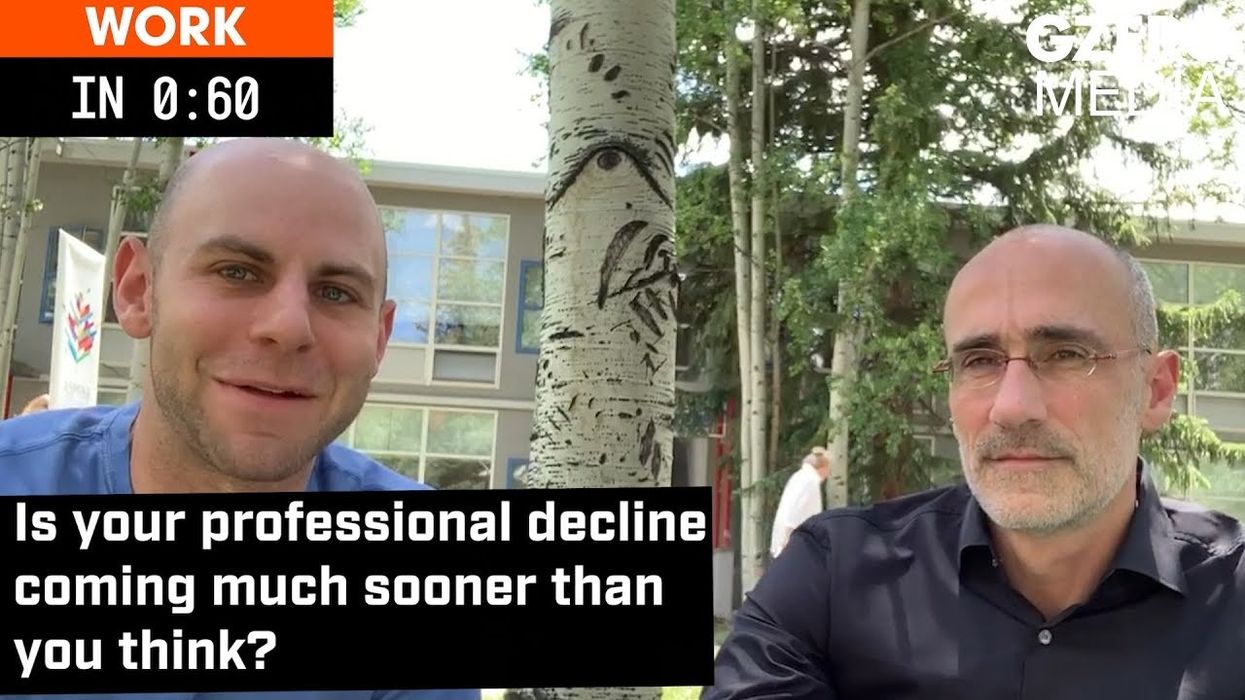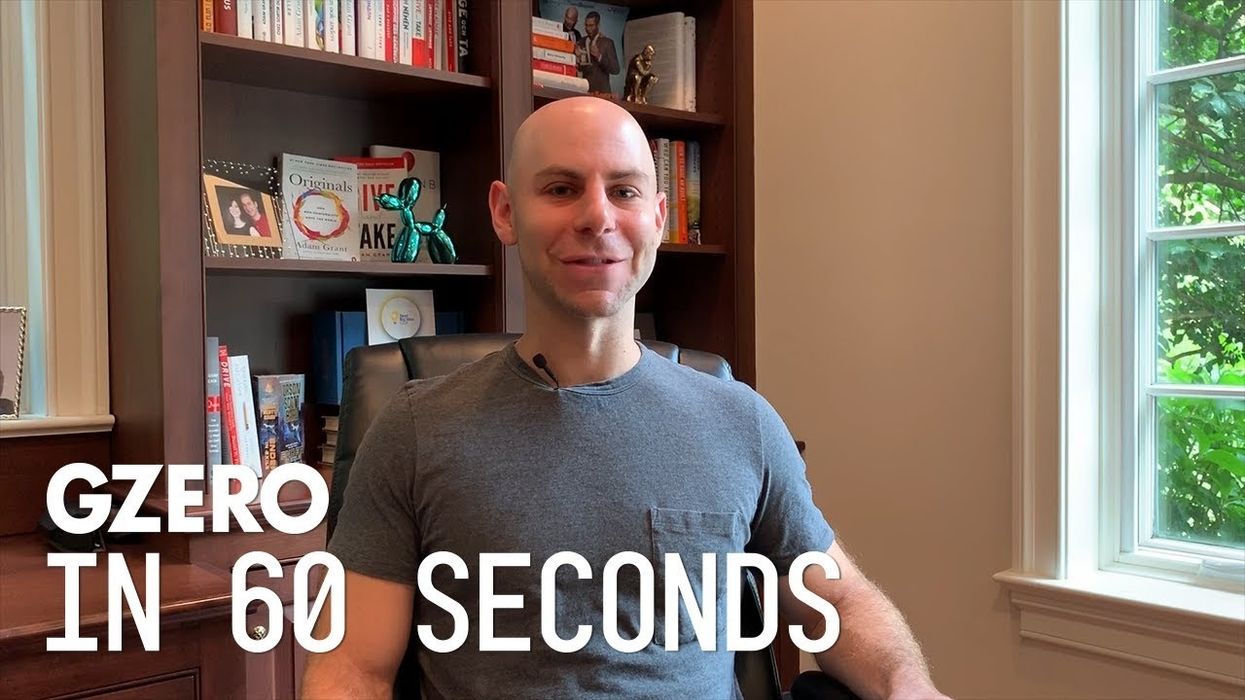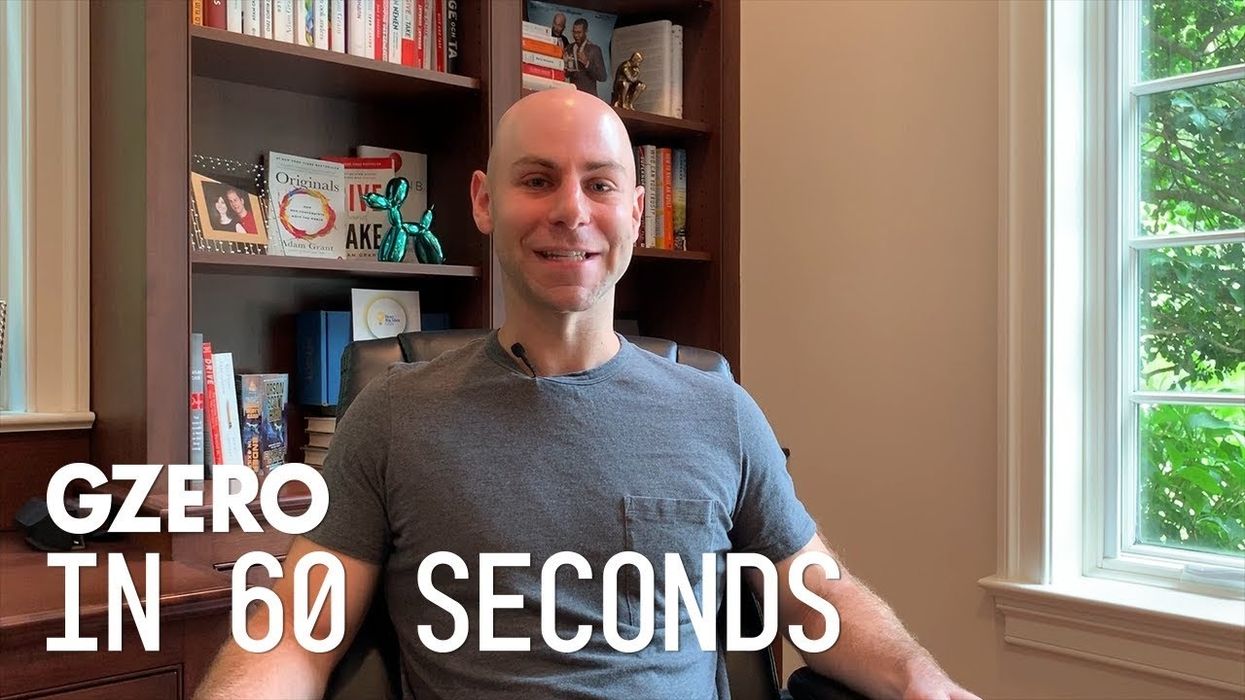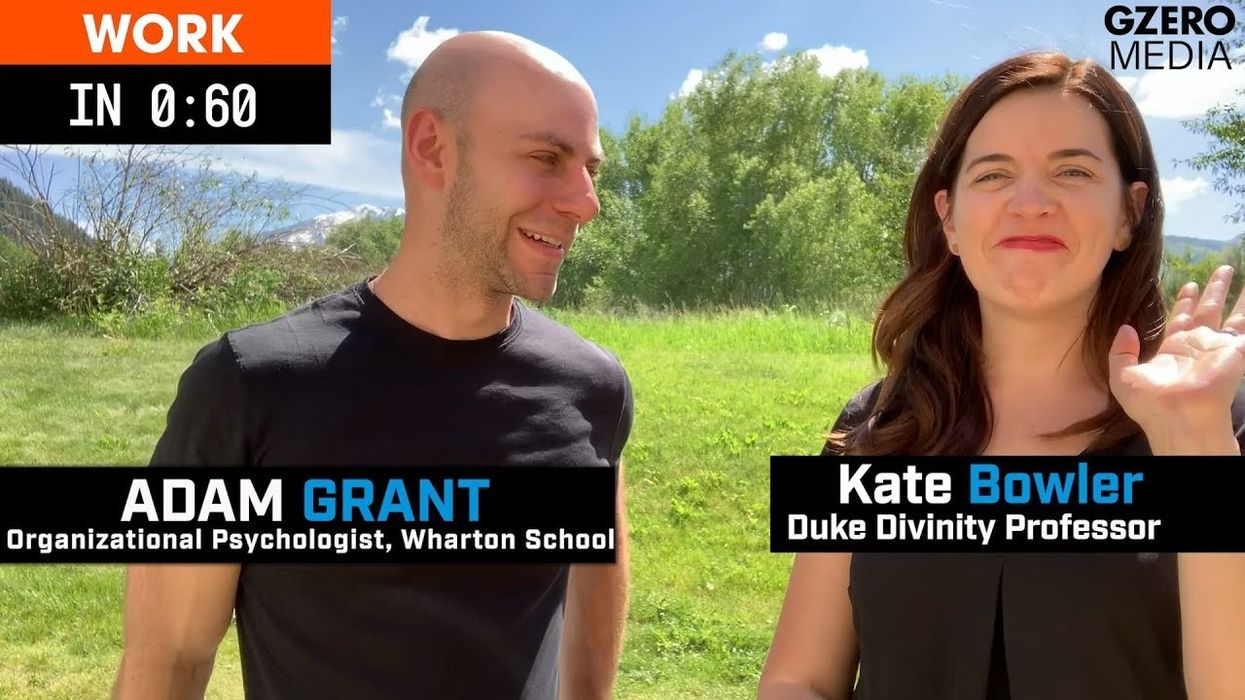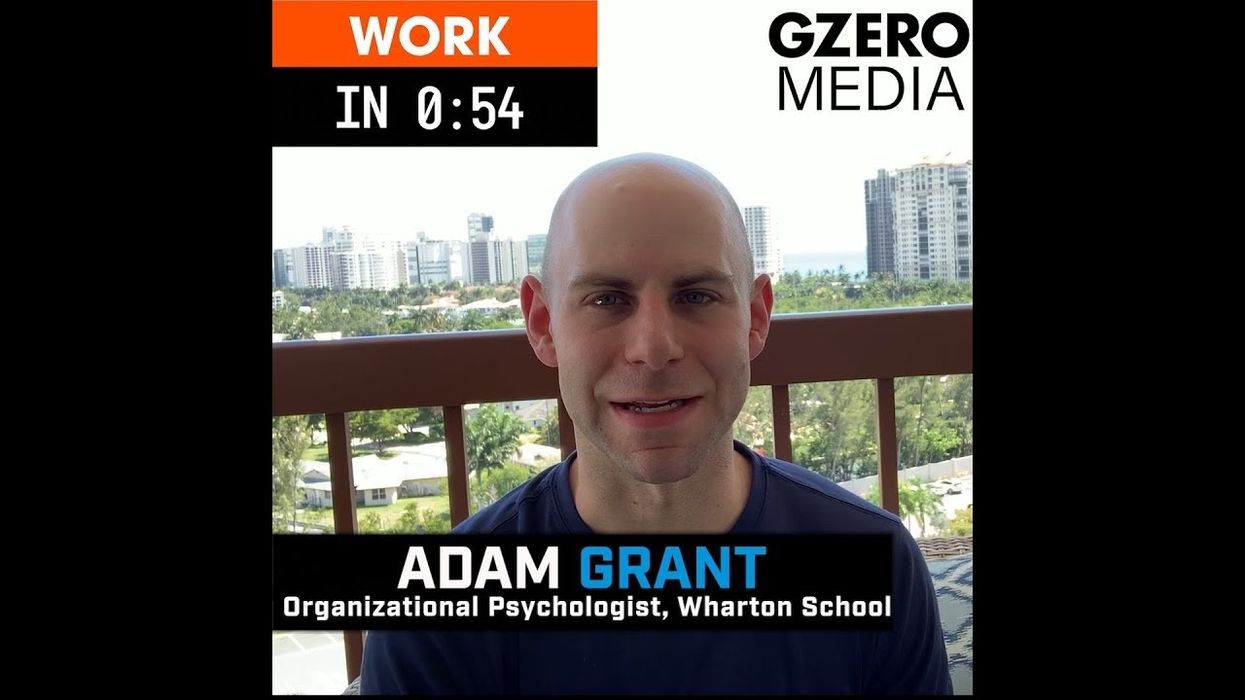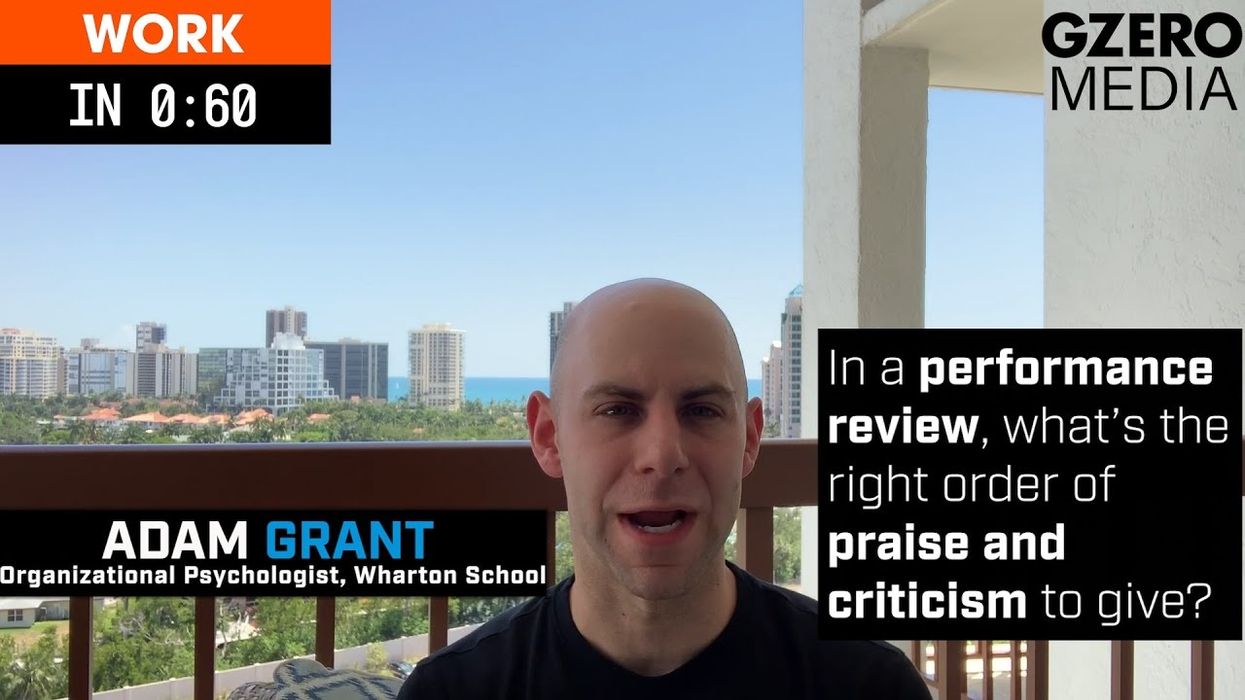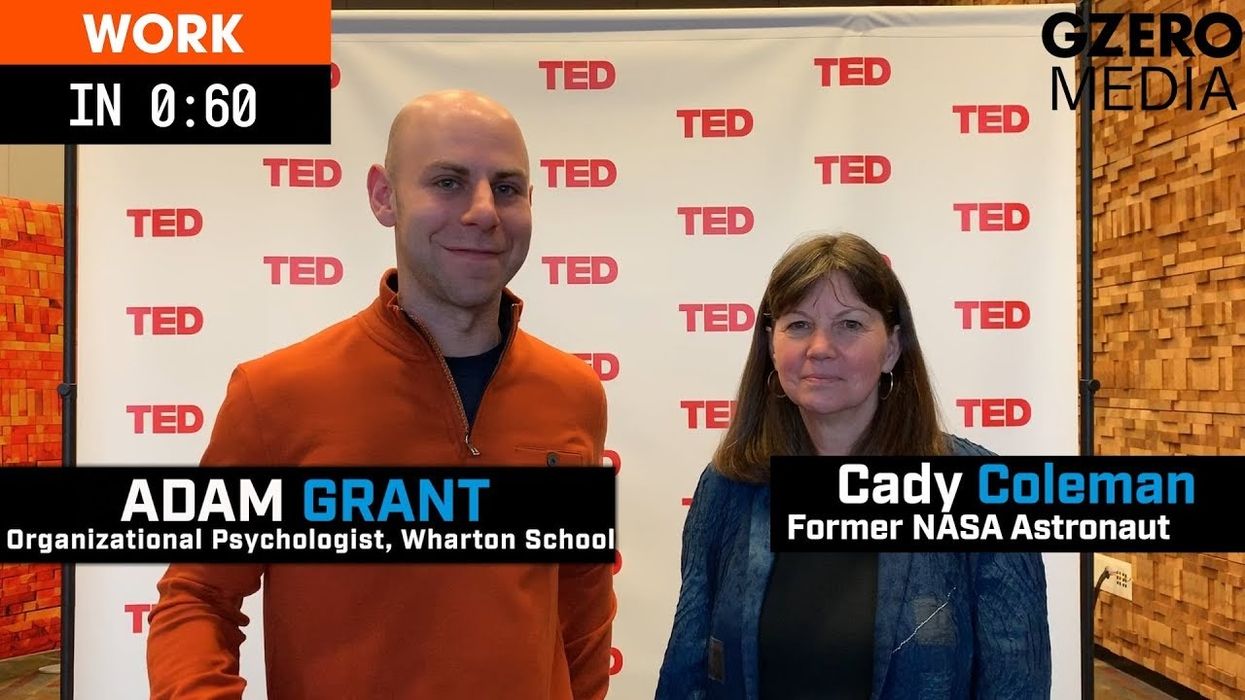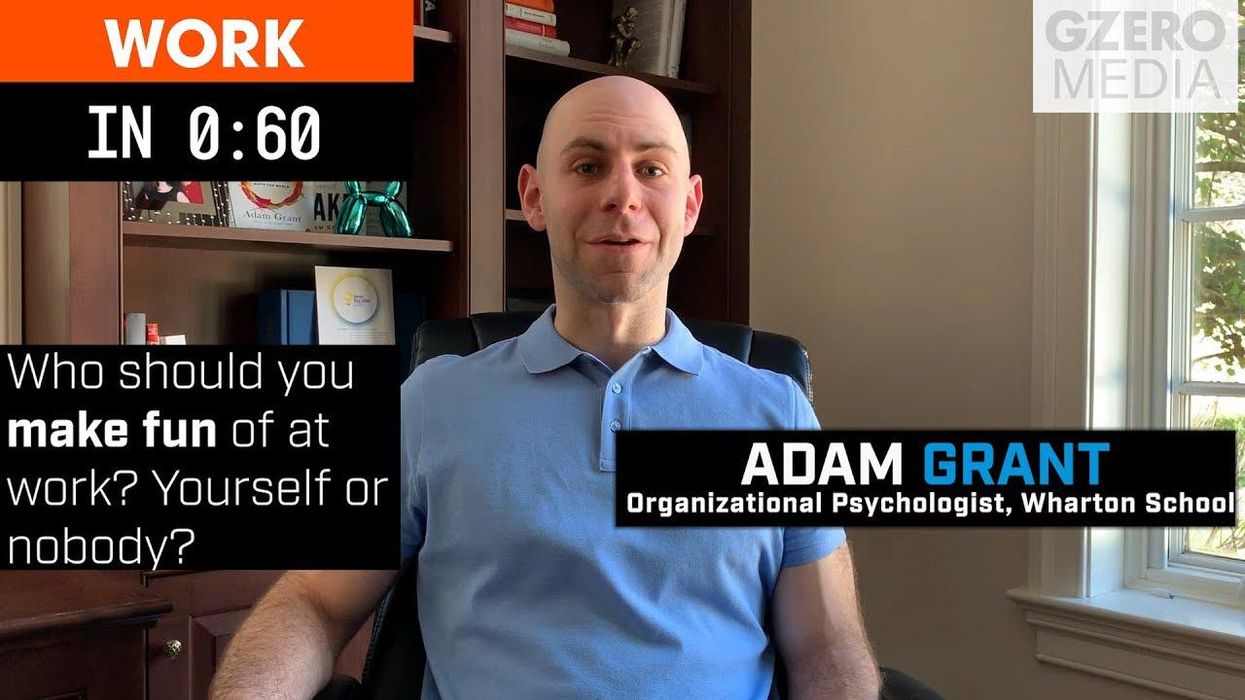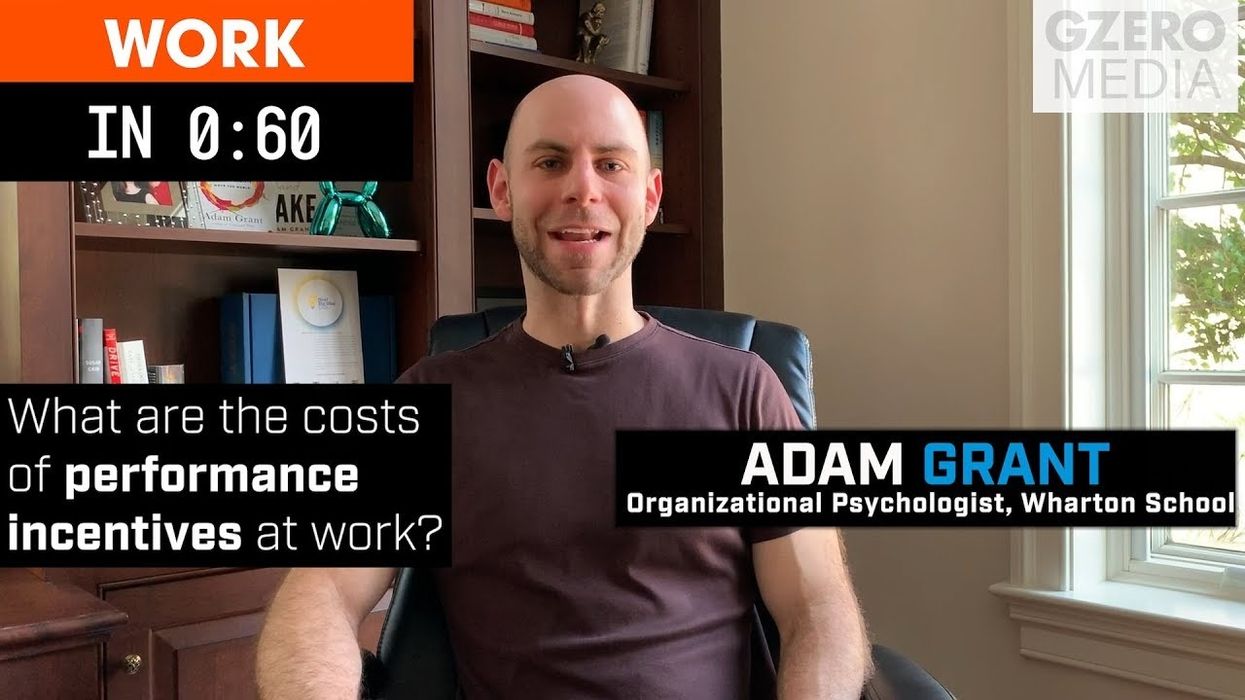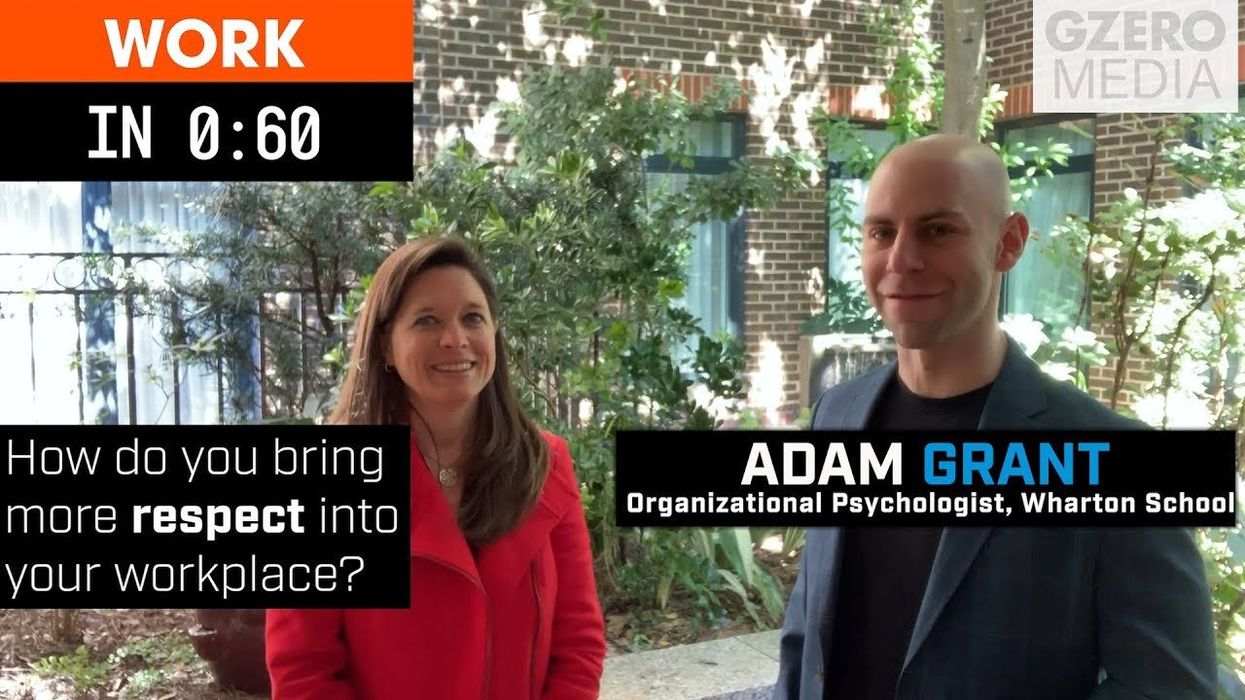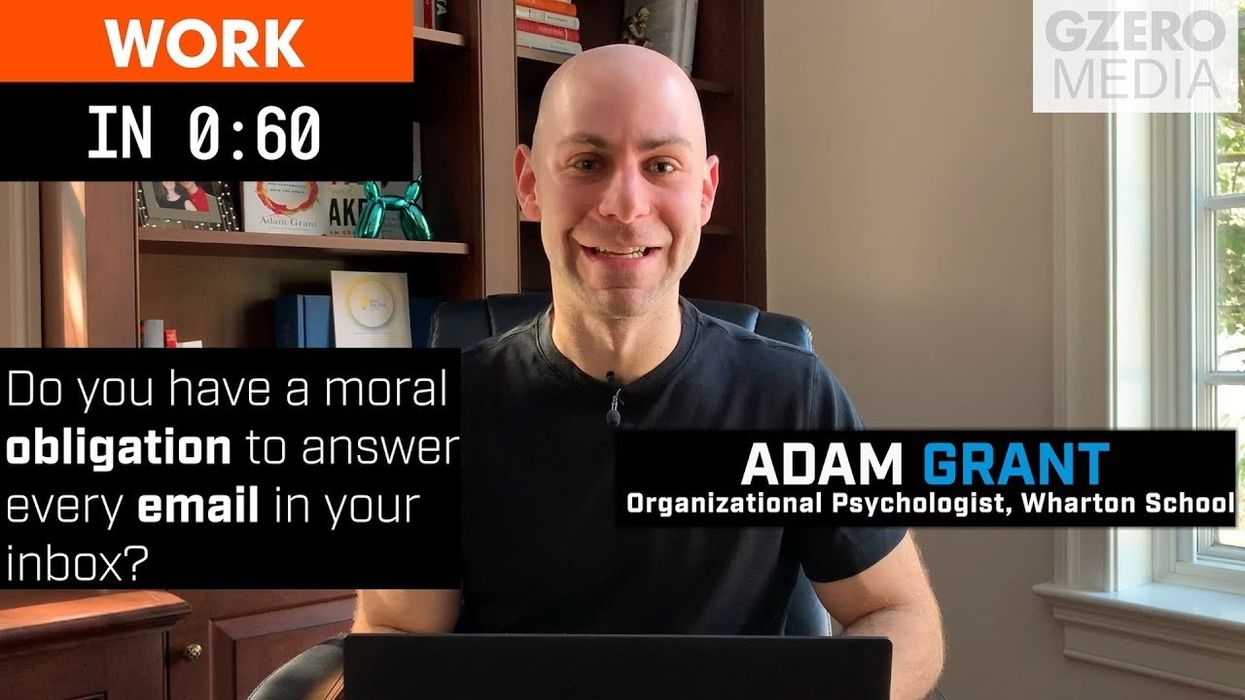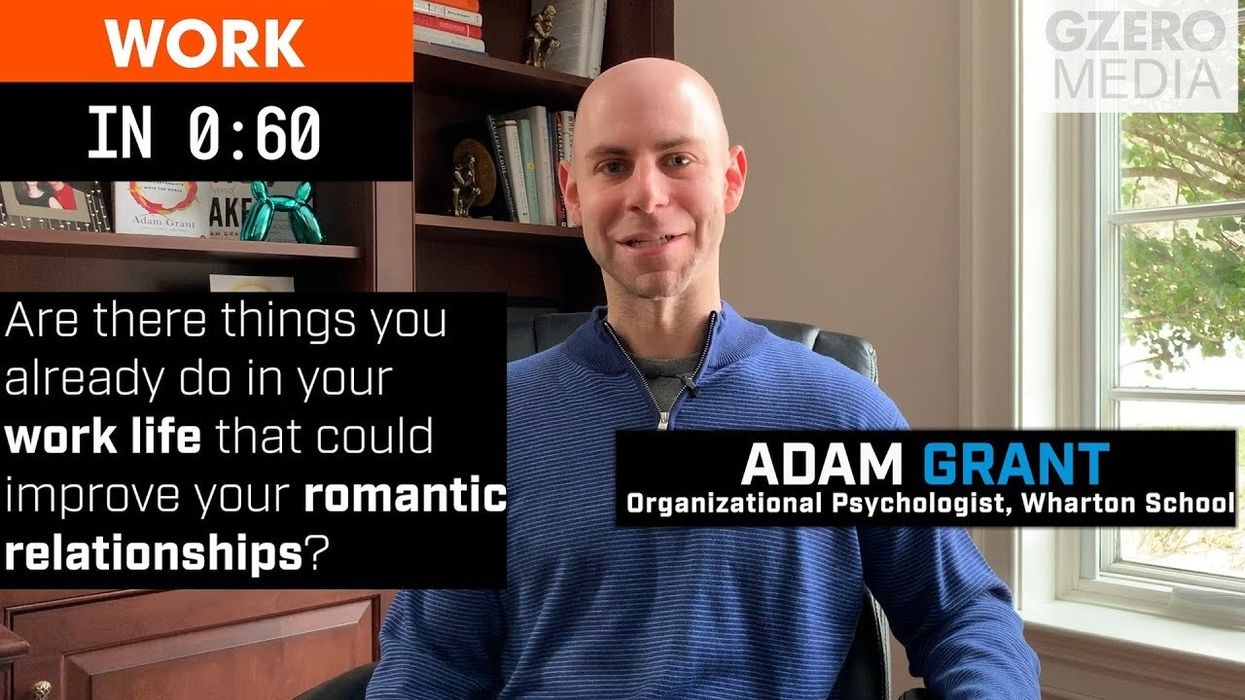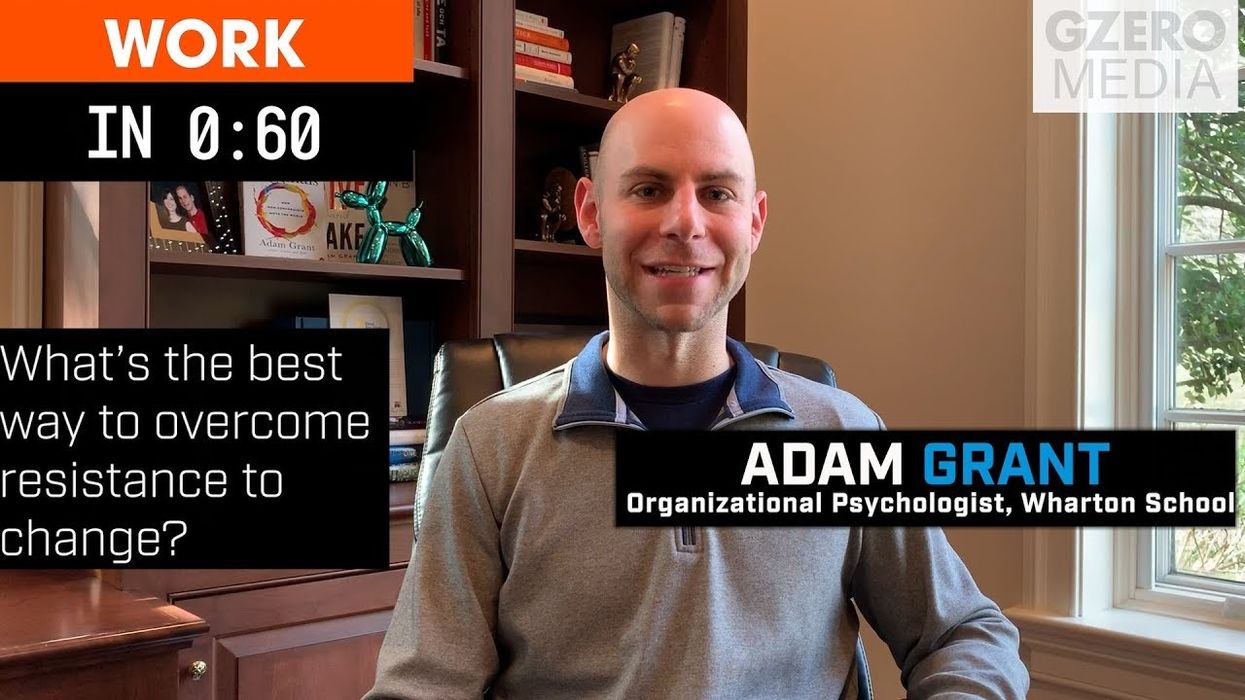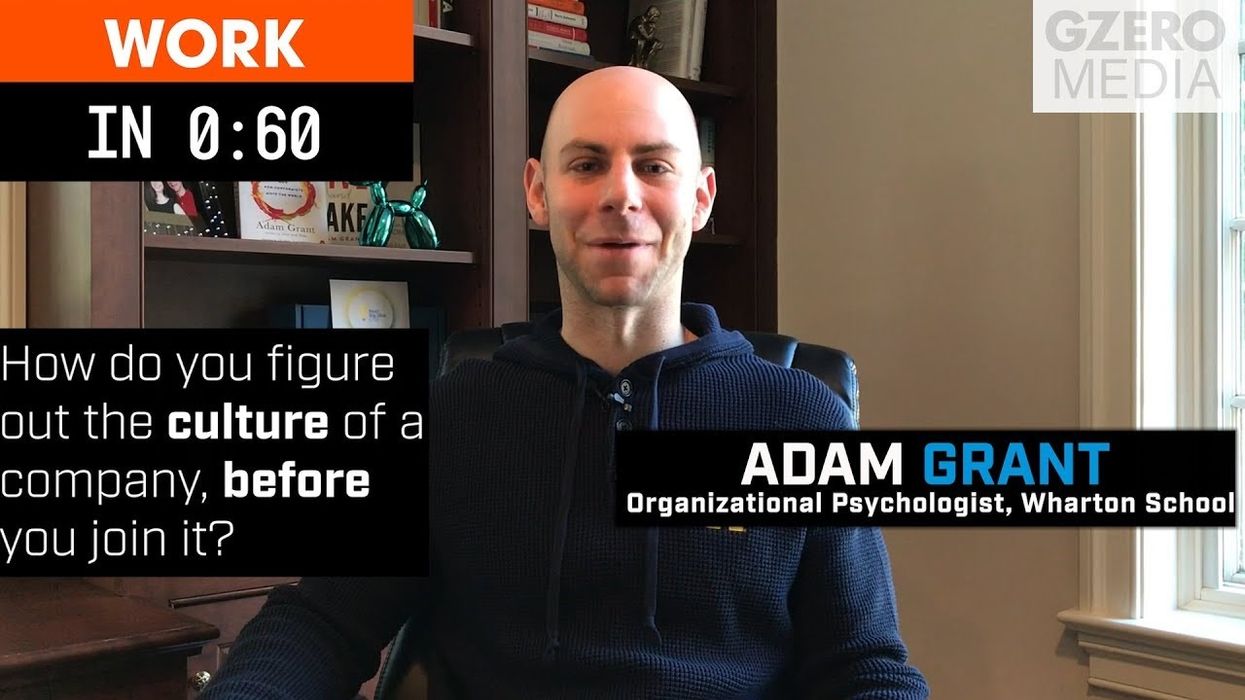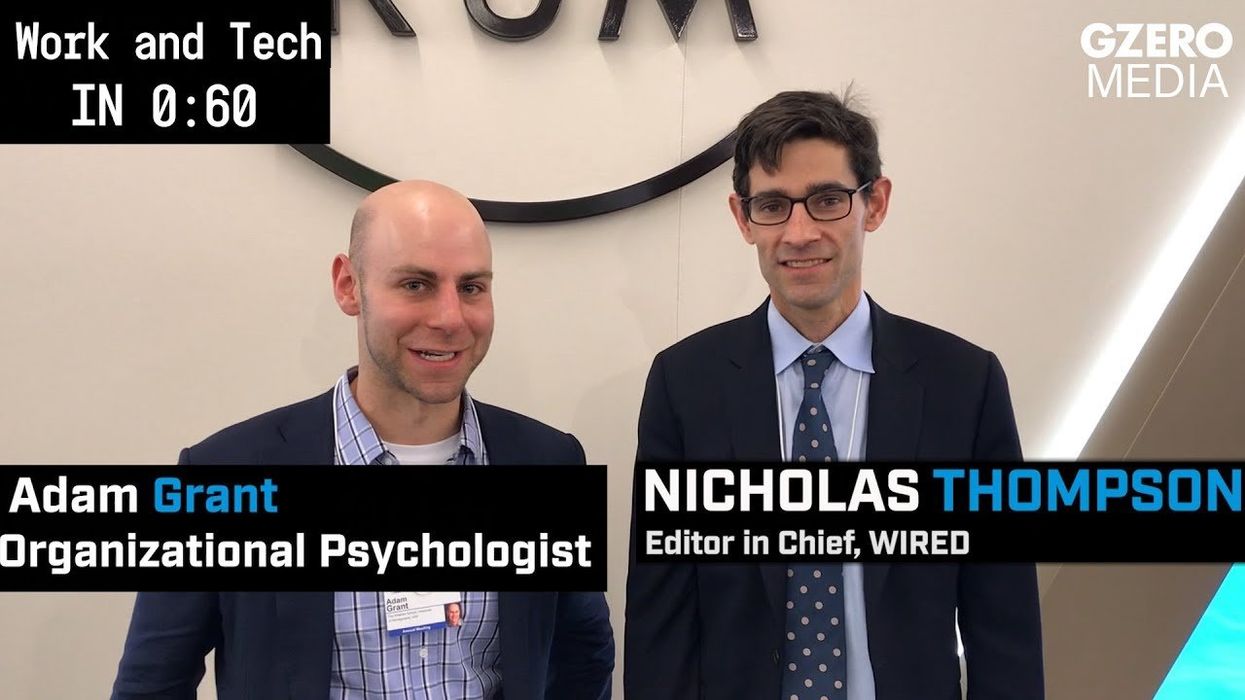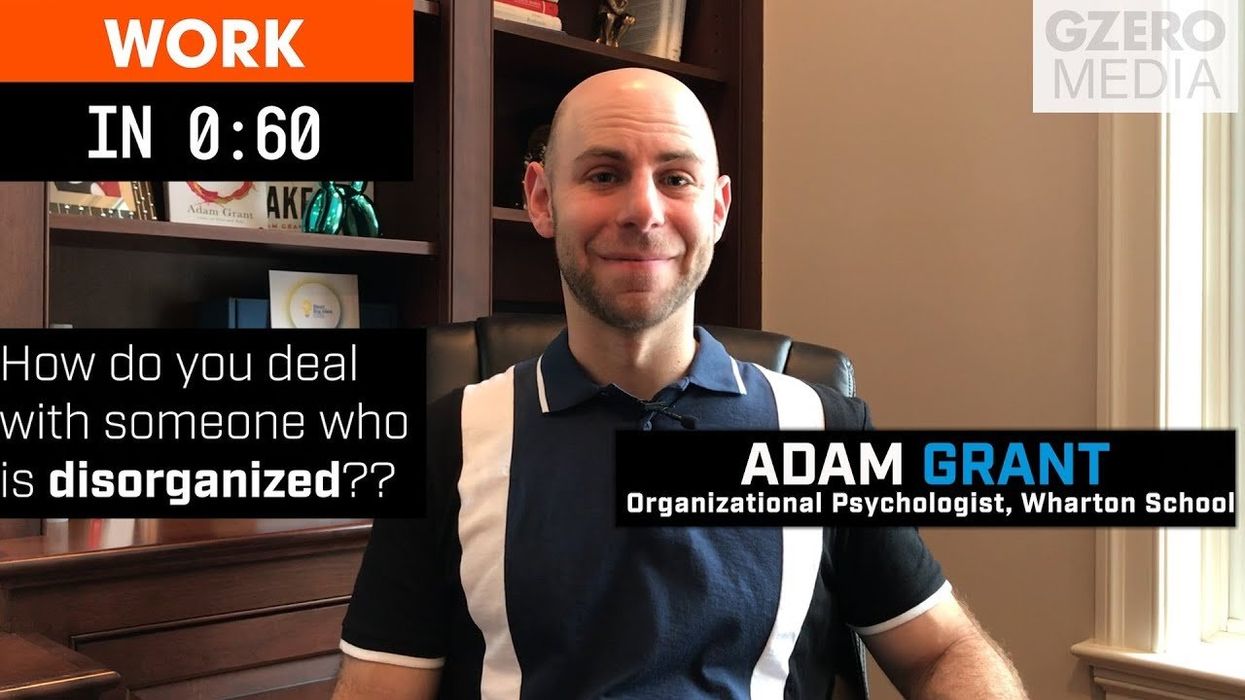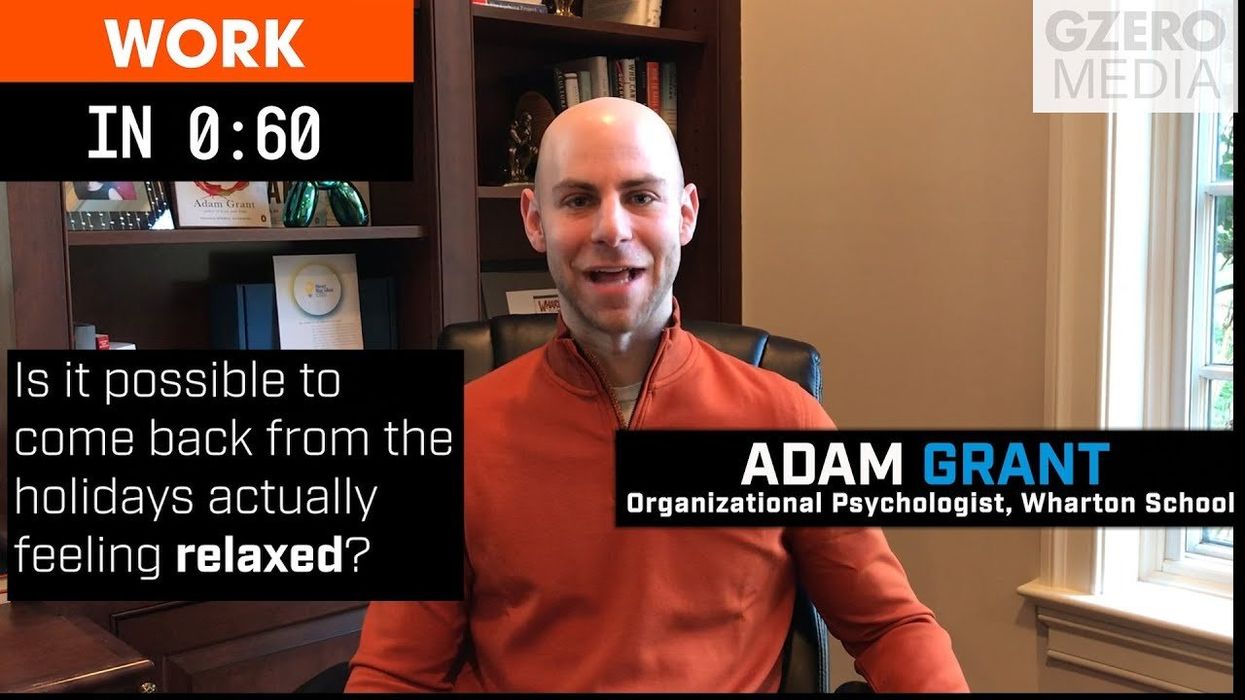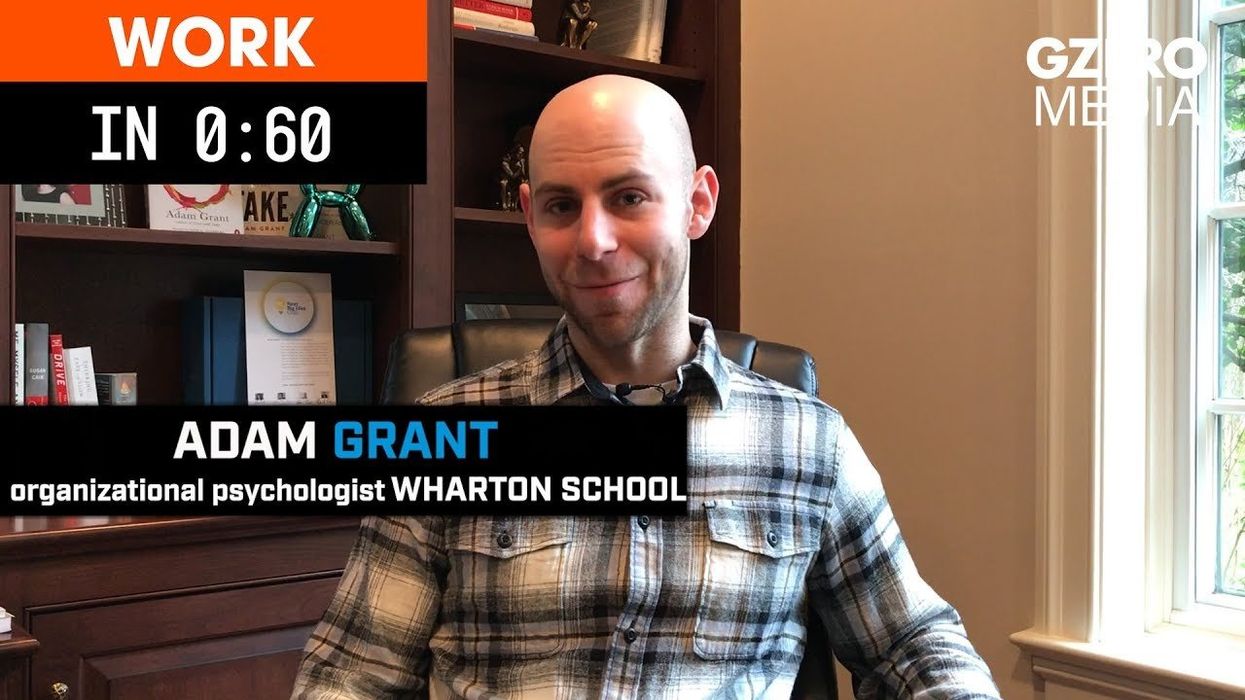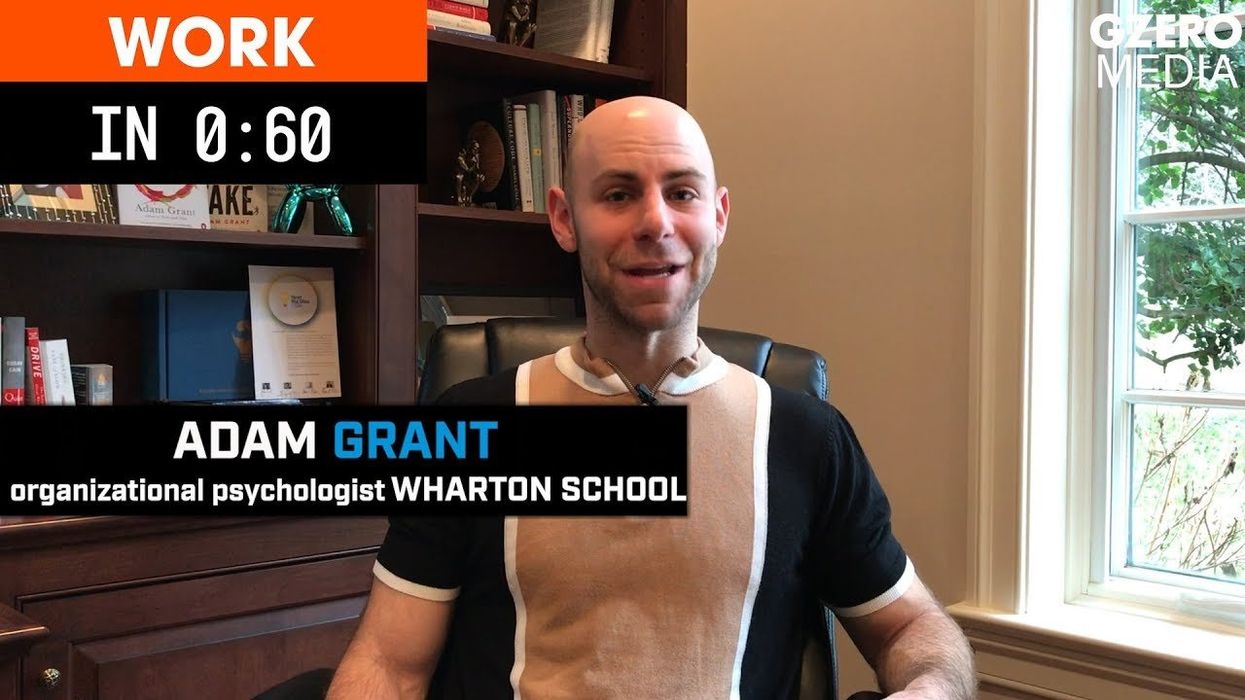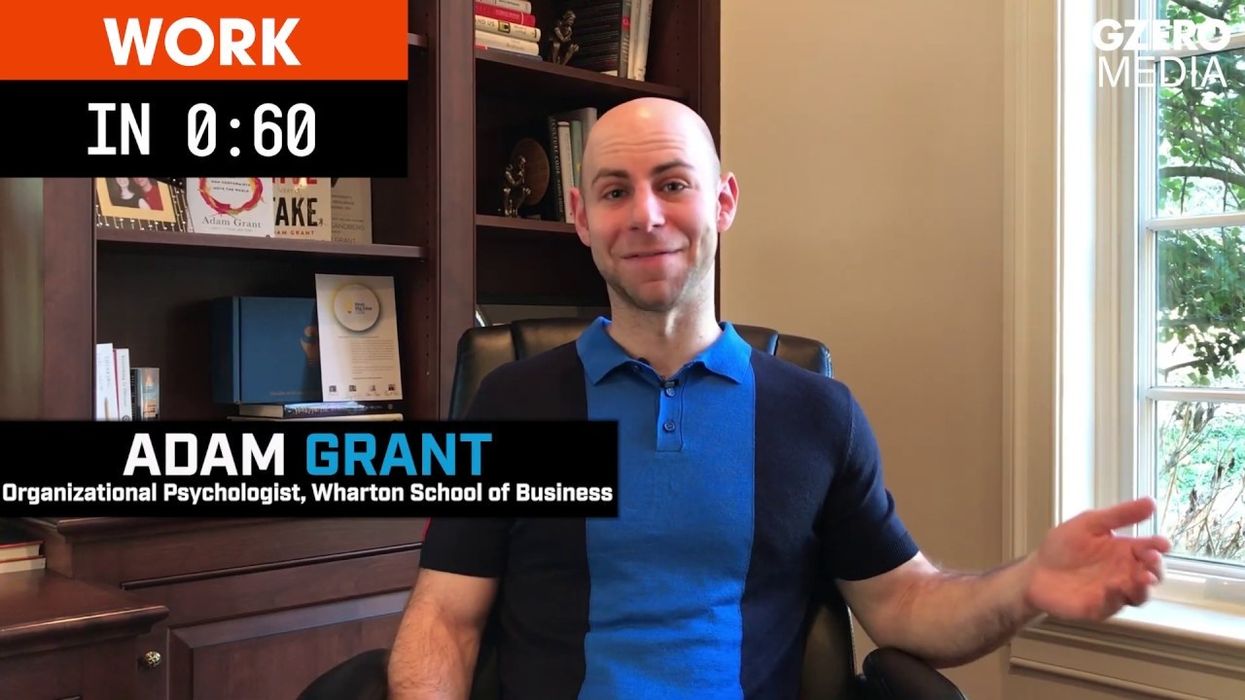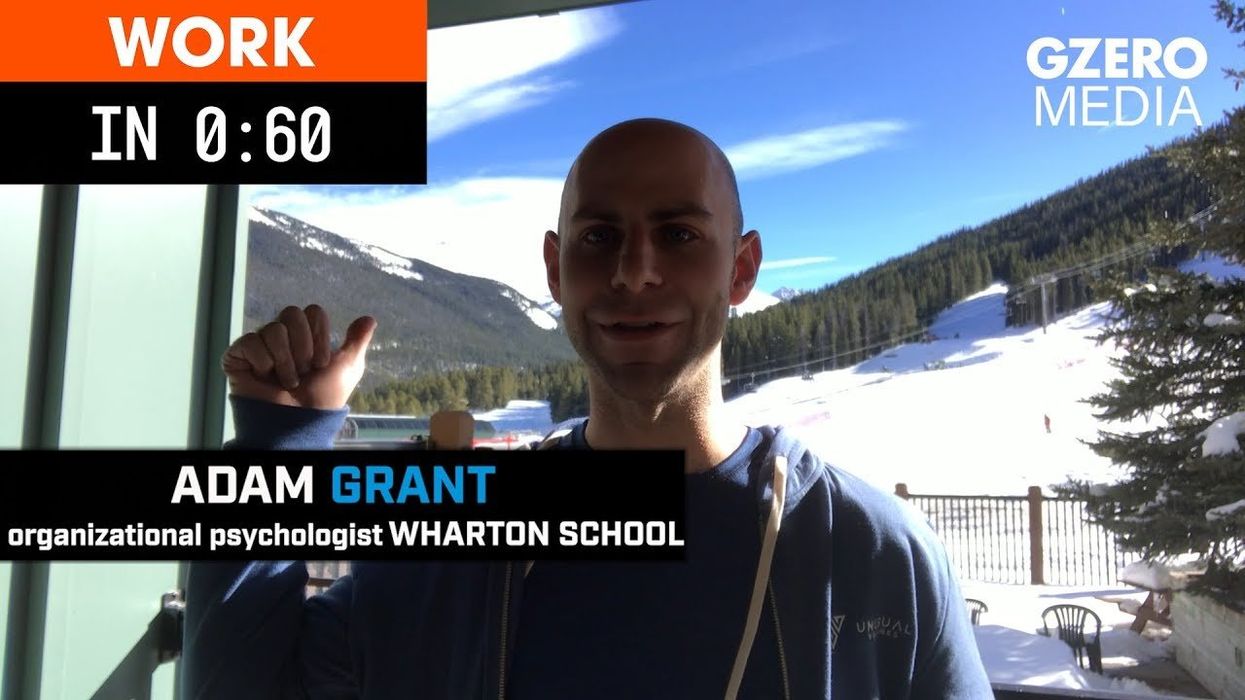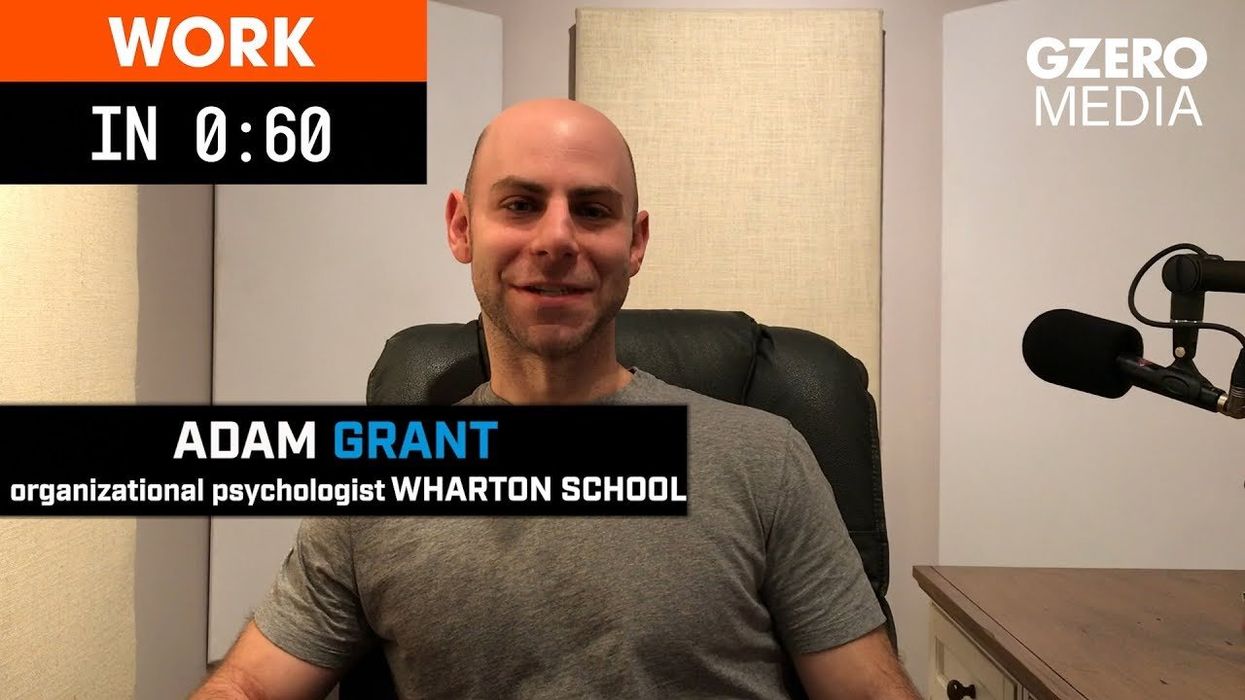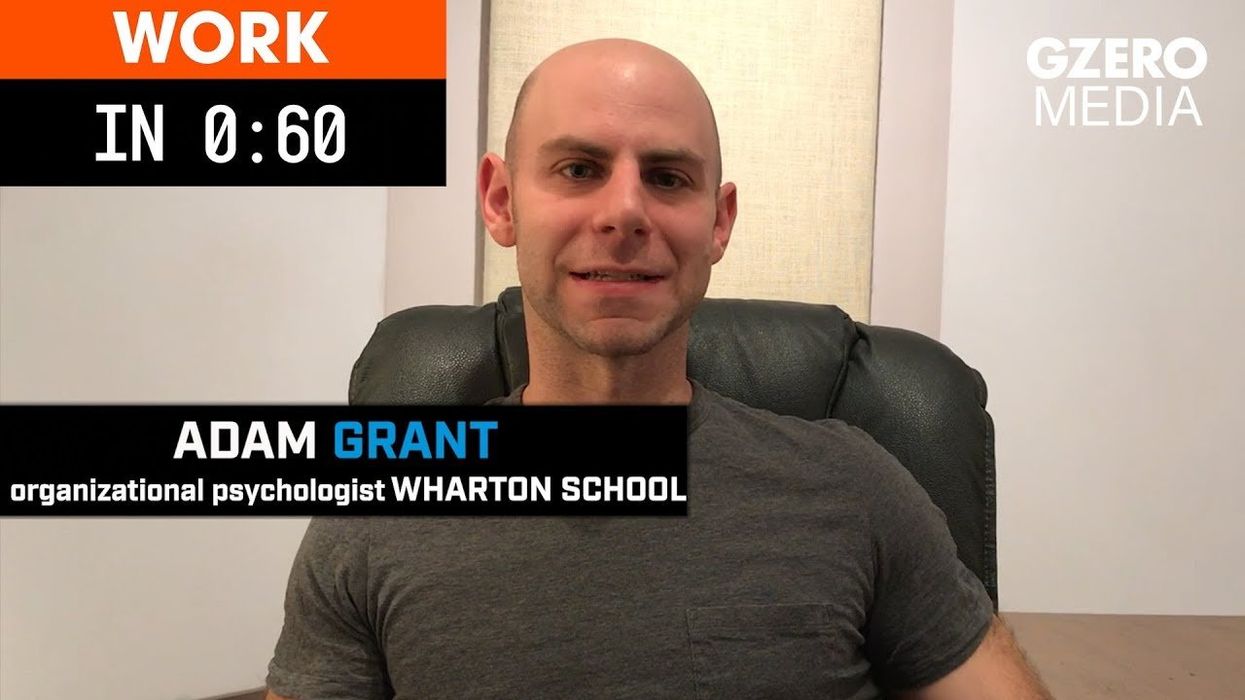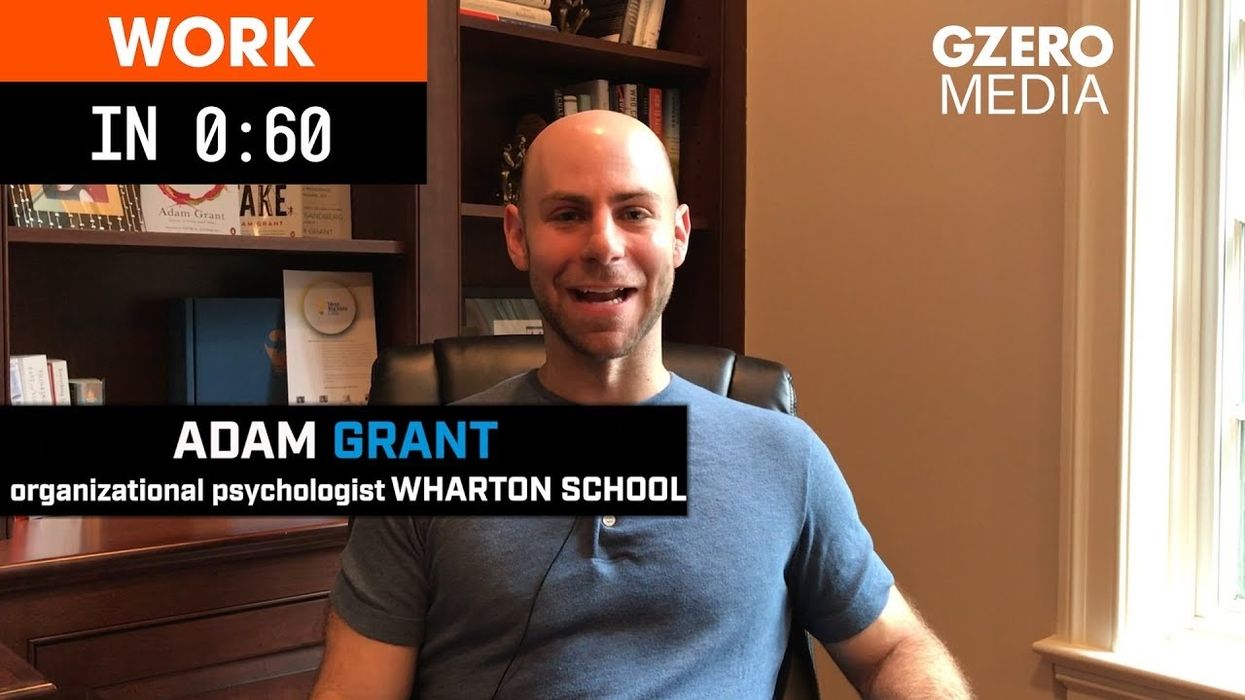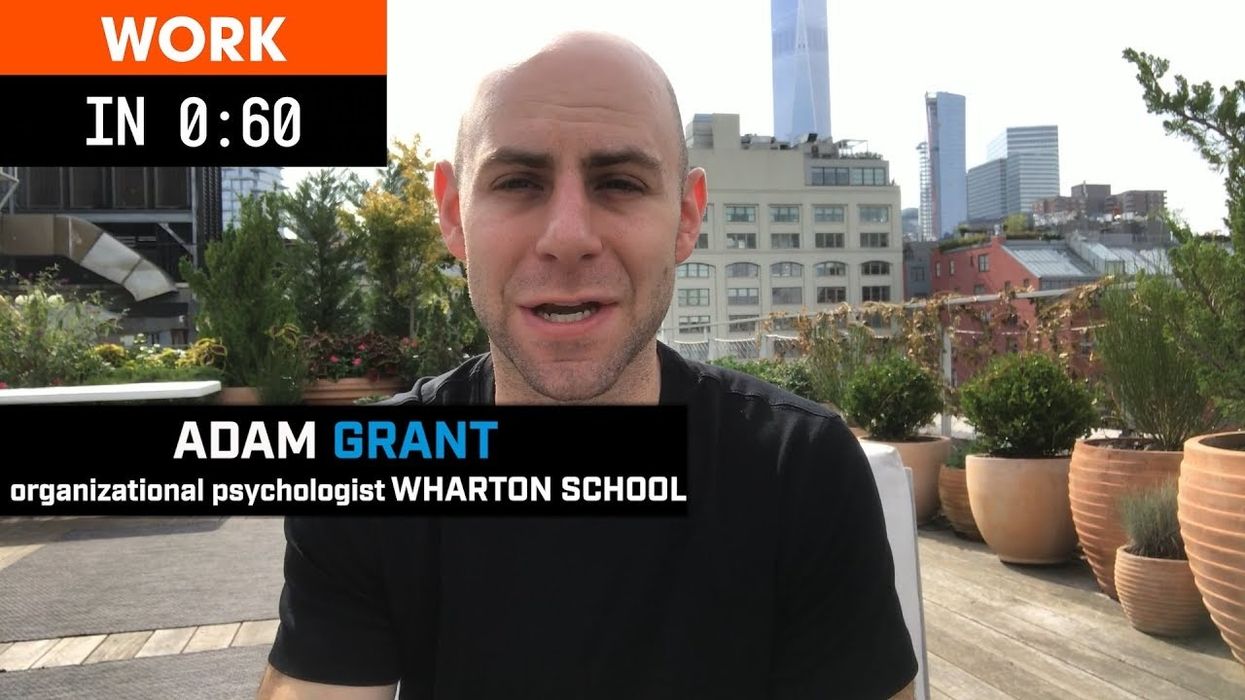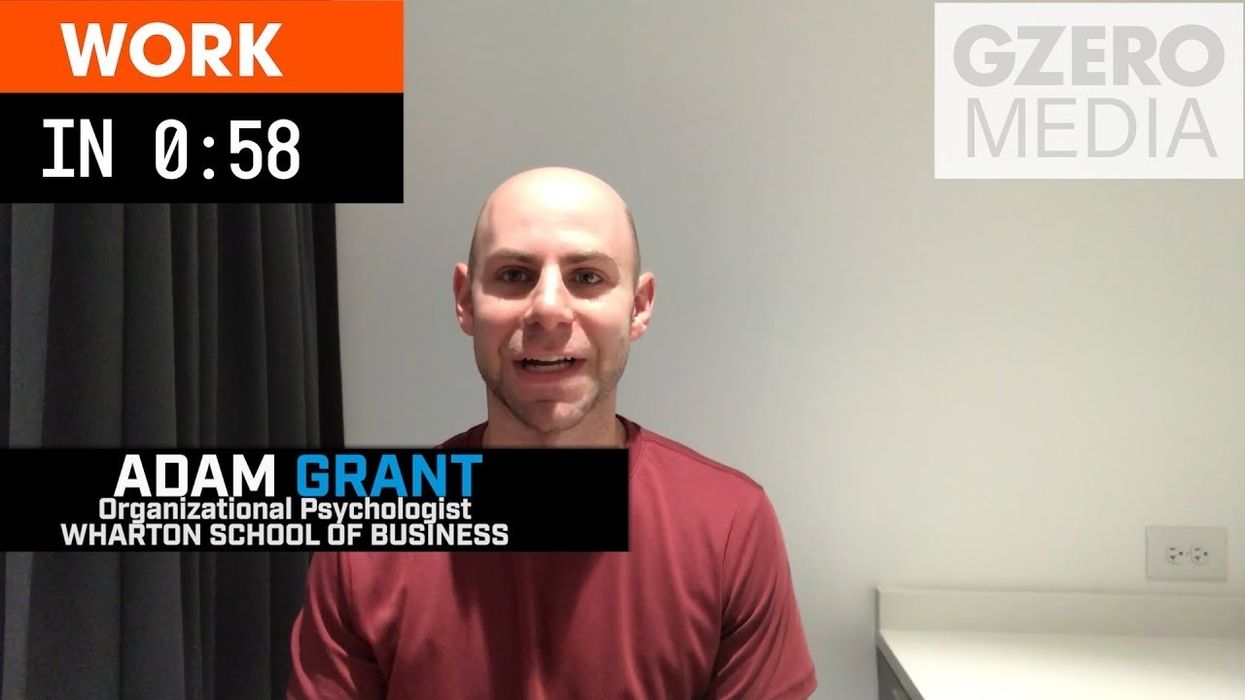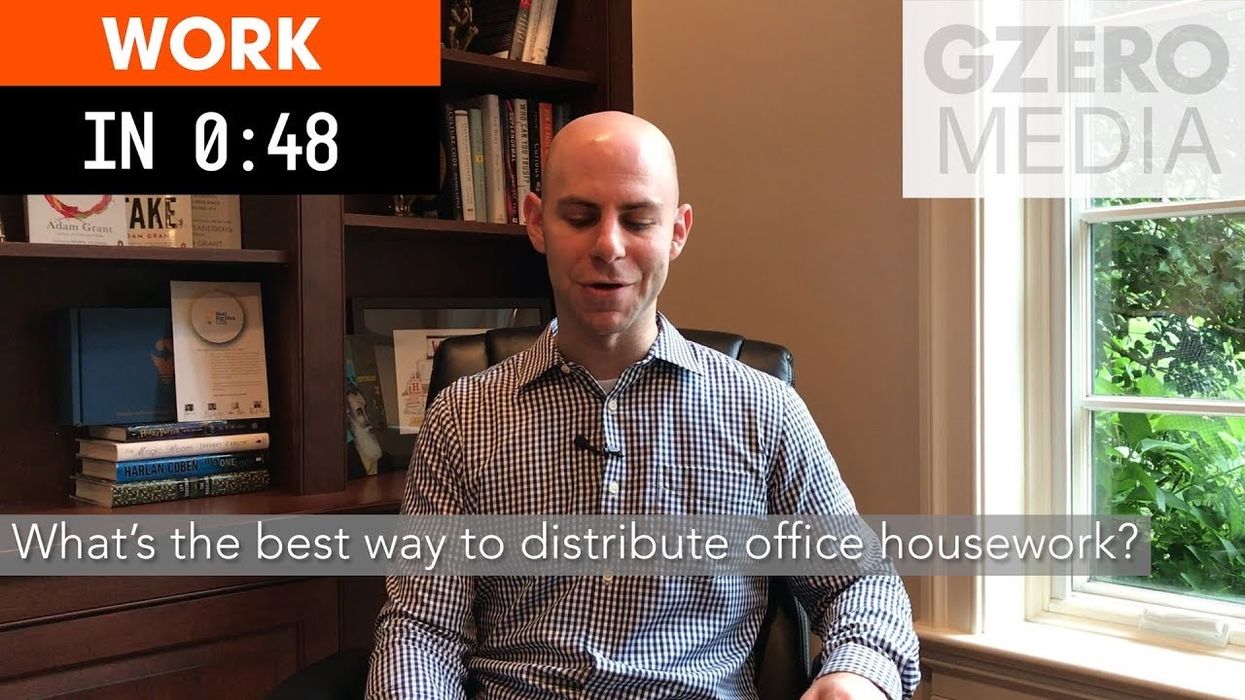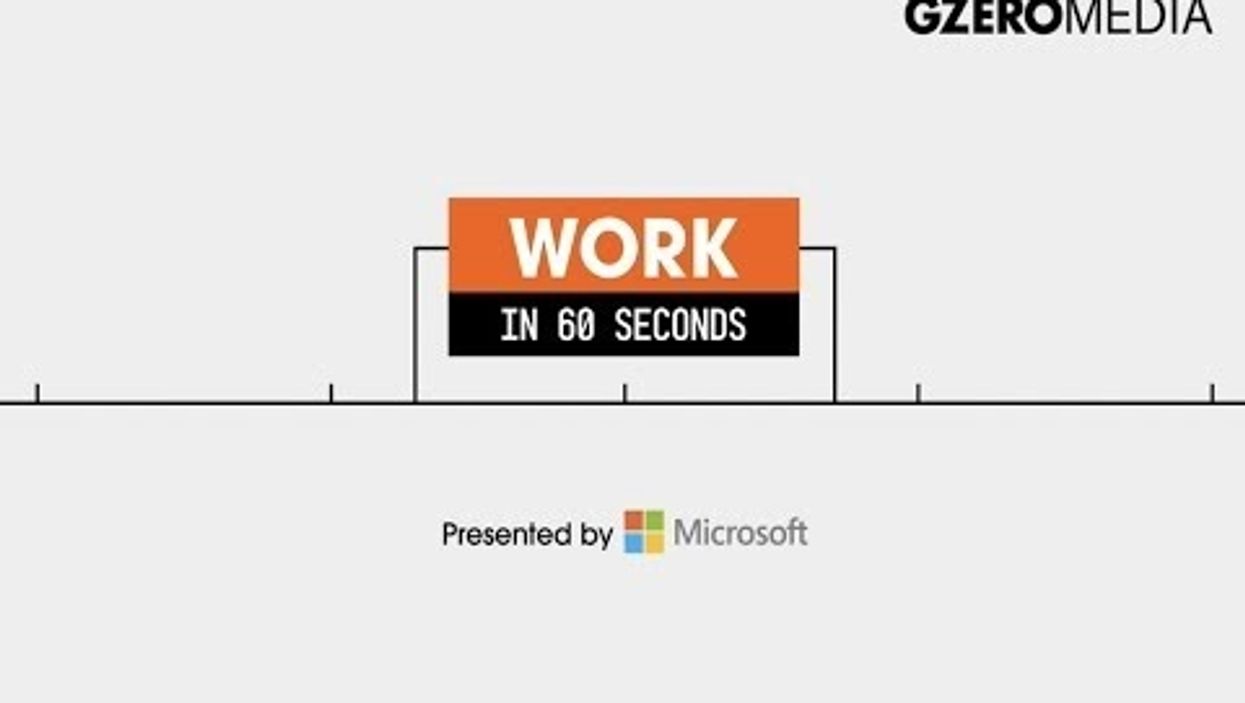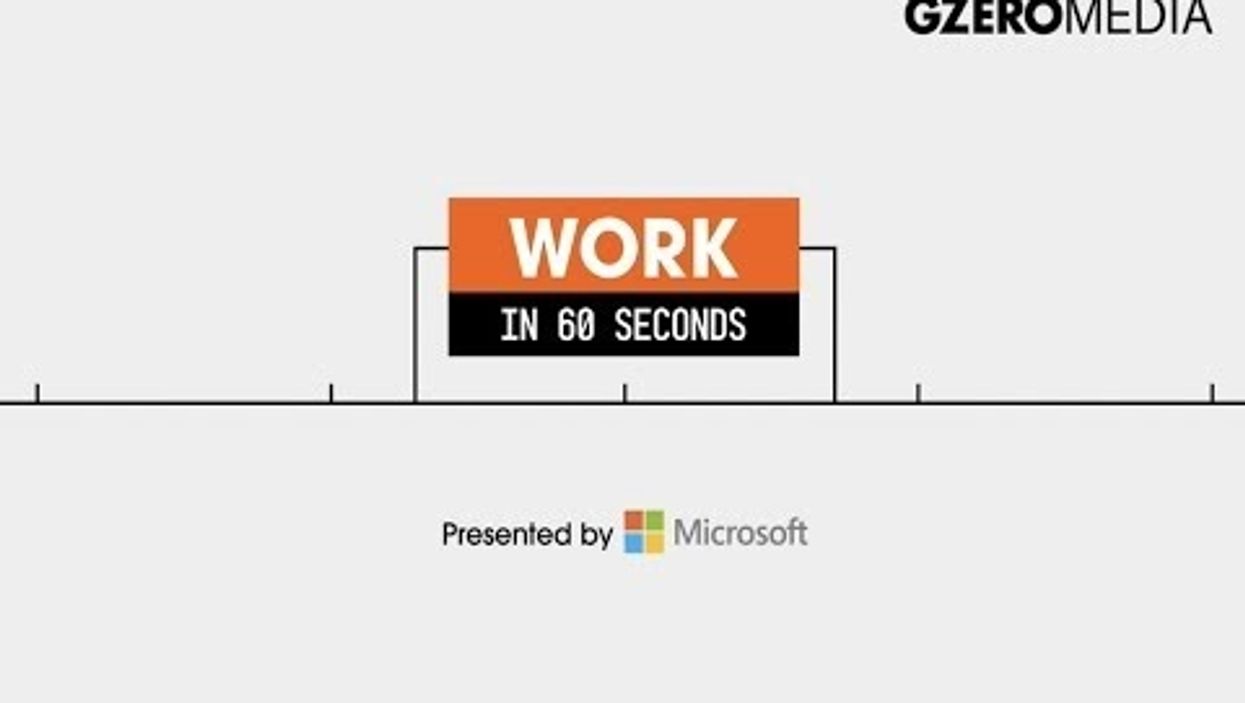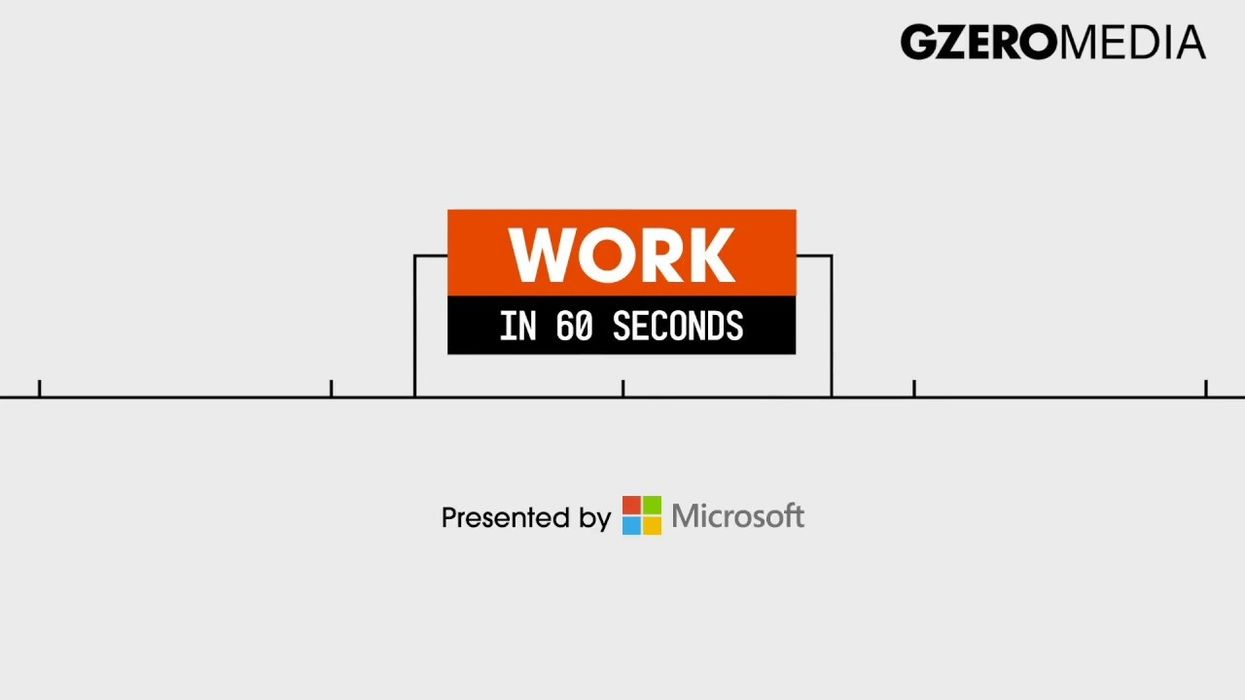VIDEOSGZERO World with Ian BremmerQuick TakePUPPET REGIMEIan ExplainsGZERO ReportsAsk IanGlobal Stage
Site Navigation
Search
Human content,
AI powered search.
Latest Stories
Start your day right!
Get latest updates and insights delivered to your inbox.
Work In 60 Seconds
Presented by
Well I'm here with Arthur Brooks an economist whose viral Atlantic article says maybe.
Yeah so I wrote this article, and The Atlantic titled it, "Your professional decline is coming much sooner thank you think" Sounds pretty bad. I have to say, but I'd meant it as a way that we can actually look forward to that back part of our careers.
-This is how economists inspire people right? You're doomed!
But it doesn't suck as bad as you thought was going to be. No, the truth is that people have a tendency to think that when they work in idea professions, which a lot of people on LinkedIn do, a lot of people who are watching us do, they think that their professional life is going to be able to go on and on and on and on and their skills are going to stay at their super high level. What made you successful when you were 30 and 35, you'll be able to do till you're 80, 85 and that turns out to be not true. The data are overwhelmingly clear that particularly after 50, 55 that a lot of idea professions people kind of lose their edge a little bit. This is one of the reasons that people burn out, not because they're sick of it, but because they kind of find they're not as good at what they were doing anymore.
OK here's the good news. There's good news.
-I've been waiting for it!
There's a success curve in your what they call your fluid intelligence. And I'm bringing coals to Newcastle by telling this to a psychologist, but the Fluid intelligence is basically your analytic capacity, your ability to innovate. And that actually does peak when you're in your early thirties and then declines after that. But there's another intelligence curve, which social psychologists call the crystallized intelligence curve, that goes up through your 30s 40s 50s 60s stays high in your 70s
-Knowledge, wisdom, social and emotional intelligence
Synthetic thinking, your ability to creatively explain all the stuff that you know, it's being a teacher. So here's the key thing that we got to understand. You're not going to be able to be on the innovation curve your whole life. It's going to decline, it's going to decline sooner than you think.
The key is jumping onto your instruction curve, to jump onto the curve of becoming a teacher, of becoming somebody who explains. And that's a really great thing. If you're basically in the early part of your 30, 35 and you're an innovator and by the time you're moving into your 50s, you're supervising others, you're bringing other people's careers along. You're explaining ideas. In a way, you and I were academics, it's ideal.
-Sort of. Except we did it backward by starting to teach way too young.
That's true, although, you know you think about it, you and I were writing academic journal articles when we were in our thirties and you know the blinding insight, right? That's the fluid intelligence and now what you're doing, you're younger than I am, What we try to do as we get older is synthesize a lot of knowledge and explain in a big way. I wrote this Atlantic piece because I'm trying to use my crystallized intelligence. I'm 55 years old you know and I'm not going to put stuff into test tubes and come up with you know sort of biotech firm.
It's just not going to happen. However I can go into my library and take out certain books and say gather around my friends because I have discovered by combining all the knowledge of these other people being a teacher and each person can do that. We don't have to write Atlantic articles or teach it at University of Pennsylvania but what we can do.
Each one of us in our own way is figure out how sharing knowledge, how developing other people, how bringing together good ideas is our future.
-Don't you think that's a form of innovation?
Yeah it is a form of innovation including crystallized intelligence.
It's an artificial distinction to a certain extent but we do find if you're trying to invent something that nobody's ever thought of before, you're going to get worse at that if you're trying to bring together the ideas that other people have thought of into something that's better and new you're going to get better at that.
-Oh good. That's the only part of creativity I was ever good at anyway, so this is encouraging!
You're a synthetic thinker.
-I've always been. I do have to say you made a very weird decision, at the end of this article, which is you said basically I'm retiring. Yes. And I was so surprised that a social scientist would make a personal decision based on aggregate data because it's possible that you at 72 are still more of a genius than your peers at 22. So how did you make that call?
Well the problem is not how I compare to others it's how I compare myself. This is what's really frustrating in a lot of people who are watching us. It's not that I'm better than the guy in the next cube or worse, it's that I'm not as good as I was last year and that's intensely frustrating to people who are at a high level.
-You can see that though? You can feel it?
I know that I'm actually a lot worse at writing new papers, you know with brand new insights, than I was able to do before, and I know what's coming as well.
-You don't think that's just a self-fulfilling prophecy?
You know it's possible.
-You've read the data and now you're convinced by them. You're a data-driven guy, as am I.
Absolutely. However, I also don't want to play the odds. And so, when I say I'm retiring, I'm simply leaving my executive position running a think tank in Washington D.C. "retiring is retiring" I mean I'm going to be a college professor at Harvard University. I'm going to teach people I'm going to synthesize ideas I'm going to write books about you know ideas that are the synthesis of a lot of other people's ideas. I'm going to live this out. So it's not really retiring, it's basically saying look, I don't want to play and I might I might defy gravity. You know, this stuff might not be right but if I actually believe the preponderance of my evidence it makes sense that I would live according to this so I have a better shot at being happier as I get older. And that's why I did it.
-All right. Well I can't argue with betting on happiness in the long run although I think that if the article undermines everybody else's happiness that would be a very sad thing. But I was surprised. I actually enjoyed it. I found it uplifting. I was even maybe a little bit inspired by your choice to say,
I inspired Adam Grant. That blows my mind.
-I'm reluctant to admit it but it's at least the second time you've done it. And so you know there's hope for economists.
I honestly believe that those of us in the idea business we have two jobs: lift people up and bring them together. Those are our two jobs. And if you can lift people up so they can be better than they were, So they can fulfill their best selves. They can understand their own dignity and potential and you can bring people together. So there's more love. What's not to like? And you just told me I did that for you and you've done that for me too. You're doing it beautifully.
Read Arthur Brooks' full Atlantic article here: Your Professional Decline Is Coming (Much) Sooner Than You Think
Keep reading...Show less
More from Work In 60 Seconds
What’s the best way to impress other people?
August 15, 2019
How to Interview Someone for a Job
August 08, 2019
What should you not say to a struggling coworker?
July 12, 2019
Why you shouldn't practice what you preach
June 07, 2019
How to give an effective performance review
May 31, 2019
How to Stay Motivated in Outer Space: Work in 60 Seconds
April 19, 2019
Who Should You Make Fun of At Work: Work in 60 Seconds
March 29, 2019
The Cost of Performance Incentives: Work in 60 Seconds
March 14, 2019
How to Avoid The Awkward Hallway Pass: Work in 60 Seconds
March 07, 2019
You're Not Morally Obligated to Answer Every Email: Work in 60 Seconds
February 21, 2019
How Your Work Life Can Improve Your Romantic Life: Work in 60 Seconds
February 14, 2019
Overcome Resistance to Change: Work in 60 Seconds
February 08, 2019
Work in 60 Seconds: Company Culture
January 31, 2019
Tech and Work in 60 Seconds: Straight from Davos!
January 25, 2019
Work in 60 Seconds: Disorganized People
January 17, 2019
Work in 60 Seconds: Holiday Burnout
December 28, 2018
Work in 60 Seconds: Make Interviews More Productive
December 21, 2018
Work in 60 Seconds: Perfectionists Don't Always Get Ahead
December 13, 2018
Work in 60 Seconds: Ditch Your 10 Year Plan!
December 07, 2018
Work in 60 Seconds: Optimal Turnover Rate
November 16, 2018
Taking Criticism, Speaking up, and new job offers
November 09, 2018
Group Meetings, New Teammates, and Compelling Arguments
October 25, 2018
Mentorship, Leadership and Failure vs. Success
October 11, 2018
Elevator Pitches, Intuition and Learning As A Leader
October 04, 2018
Bad Performance Reviews, Too Much Delegating, and Shorter Work Day
September 29, 2018
Job Quitters, Office Housework and Is Team Building Worth It?
September 13, 2018
Mentoring, open-plan offices and rude coworkers
August 09, 2018
GZERO Series
GZERO Daily: our free newsletter about global politics
Keep up with what’s going on around the world - and why it matters.
